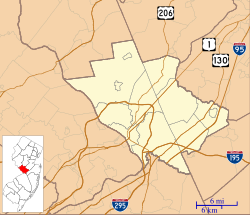Princeton Law School
This article needs additional citations for verification. (December 2017) |
Ivy Hall | |
The Ivy Club, to which it gave its name, and now home to the choir of Trinity Church, Princeton | |
| Location | Mercer and Alexander St, Princeton, New Jersey |
|---|---|
| Coordinates | 40°20′48.2″N 74°39′53.5″W / 40.346722°N 74.664861°W |
| Built | 1846 |
| Architect | John Notman[1] |
| Architectural style | Italianate |
| Part of | Princeton Historic District (ID75001143) |
| Added to NRHP | June 27, 1975 |
The Law School at the College of New Jersey (now
In 1935, the university once again formed appreciable plans for the start of a law school but was unable to secure a faculty. In 1974, then president of Princeton, William G. Bowen, selected a committee to investigate and advise on the achievability of a law school. The committee recommended plans for a law school be deferred after citing high construction costs. Princeton, Brown, and Dartmouth are the only Ivy League schools to lack a law school.
Mistaken and fictional references
At a press conference of law school deans in 1998 decrying the annual
A 2003 National Review Online commentary blundered when the author, Candace de Russy, identified the law school at Princeton as real: "These yearnings are embodied in a doctrine called ‘transnational progressivism,’ which is gaining prominence in law schools, for example, at Princeton and Rutgers".[2]
Similarly, during the
Princeton University does award honorary degrees of law.
Notable faculty
Notes
- ^ Jan Hoffman, "Judge Not, Law Schools Demand Of a Magazine That Ranks Them", New York Times, February 19, 1998.
References
- doi:10.2307/26403286. Retrieved 15 November 2023.
- National Review Online. Archived from the originalon 2003-04-07. Retrieved 2011-09-27.
- ^ "U.S. Senator Dick Durbin to College students: 'You are our future' | The College | The University of Chicago | The University of Chicago". college.uchicago.edu. 2022-02-09. Retrieved 2023-10-18.
- ^ "Seven leaders in arts, humanities, sciences and public affairs receive honorary degrees" (Press release). Princeton University. 2001-06-05. Retrieved 2011-09-27.
Sources
- Leitch, Alexander (1978). A Princeton Companion. Princeton University Press. ISBN 0-691-04654-9.



